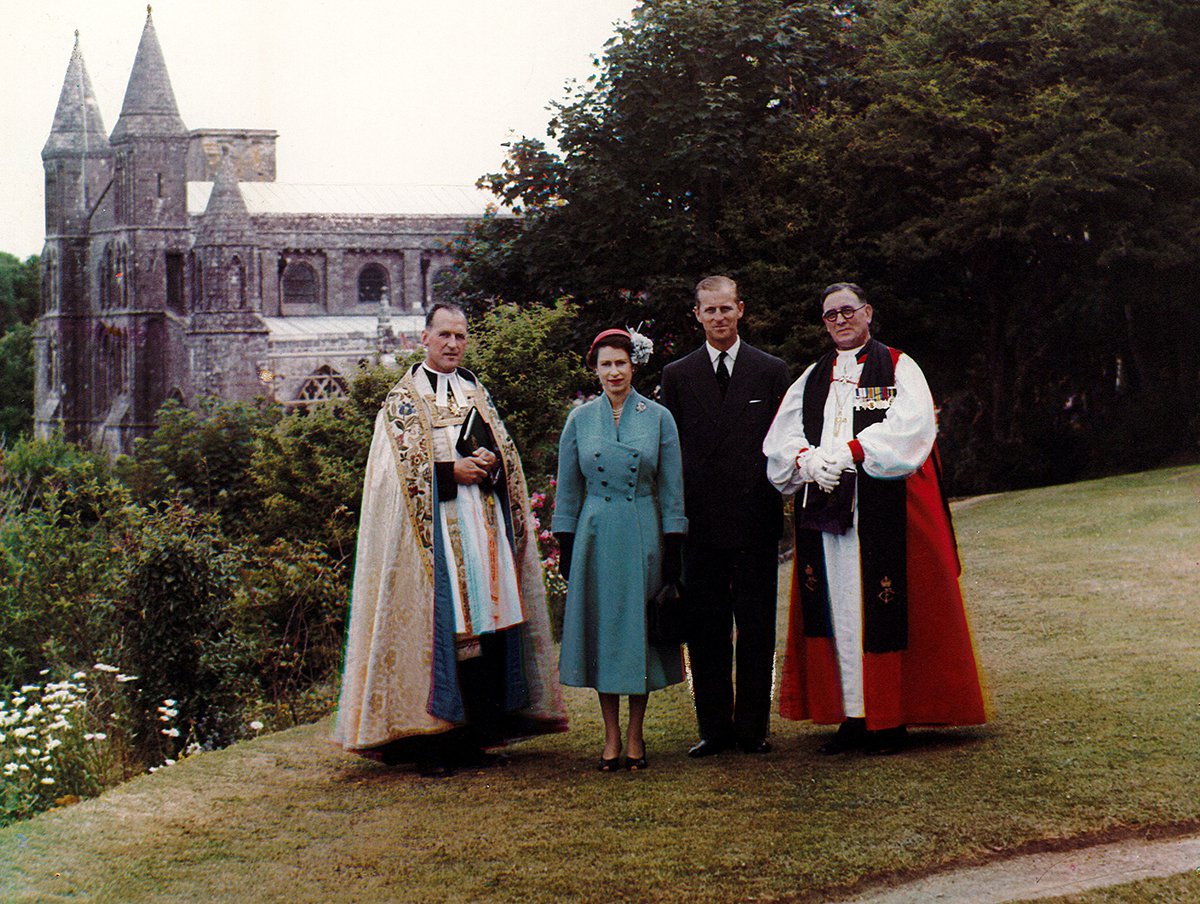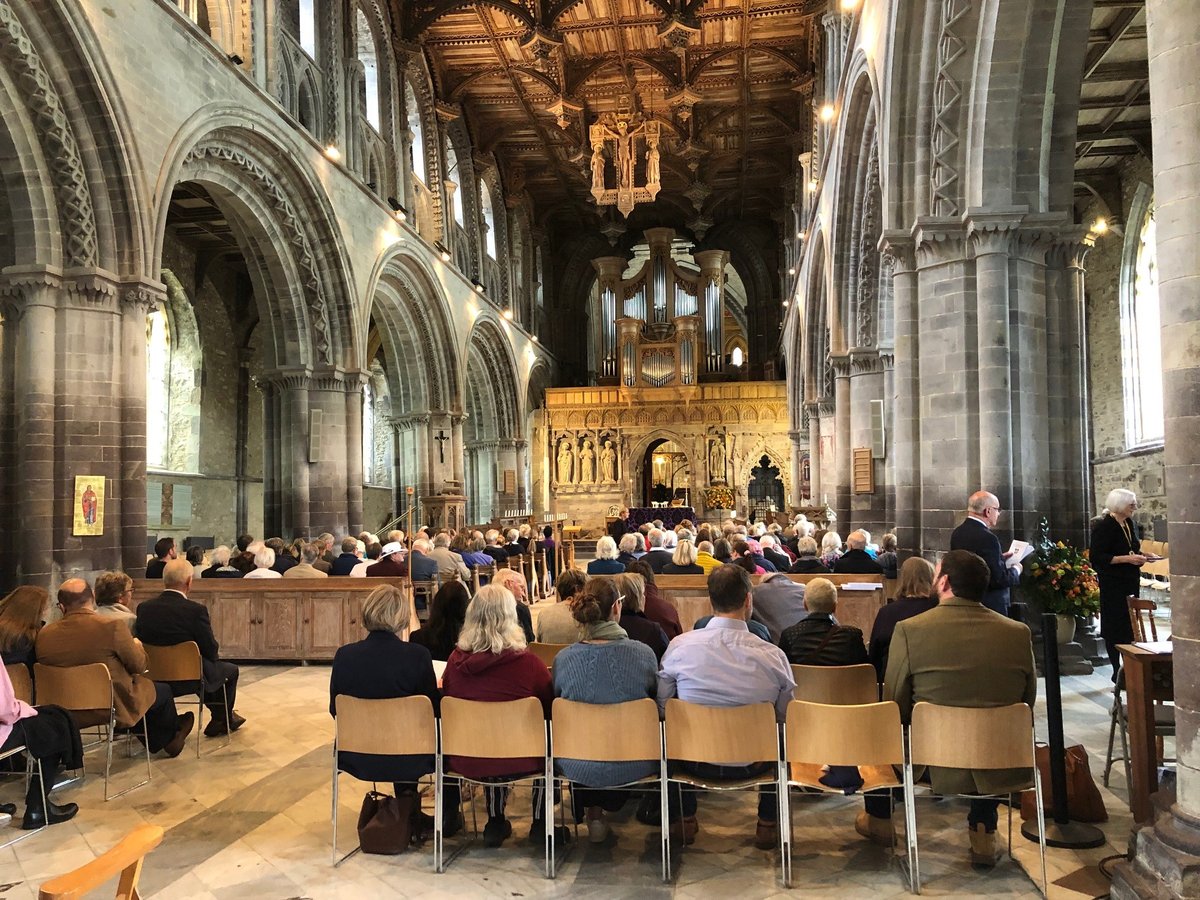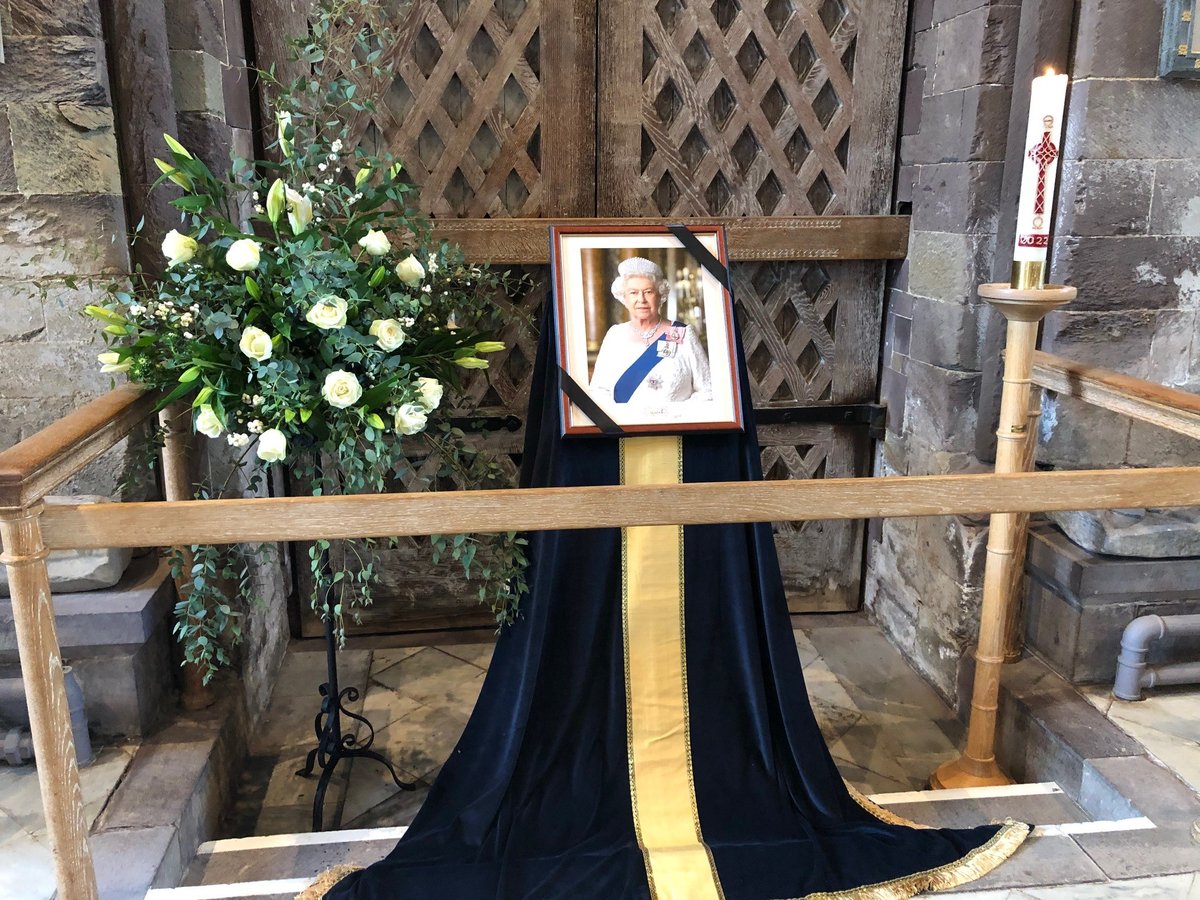Dean reflects on the late Queen's faith
Her late Majesty the Queen had a unique connection with St Davids Cathedral. As Sovereign, she held the First Canon Cursal Stall in the Quire among the Cathedral Chapter, and she took her place there on some of her four visits to the Cathedral. She was also the first monarch to visit the Cathedral since the Reformation. In a moving sermon on Sunday, following the Queen's death, the Dean of St Davids, Sarah Rowland Jones LVO OBE, reflects on Her late Majesty's faith.

‘Mae'r Arglwydd yn dda i'r rhai sy'n ei drystio … Y mae'n dda disgwyl yn dawel am iachawdwriaeth yr Arglwydd’ – ‘The Lord is good to those who wait for him … it is good to wait quietly for the salvation of the Lord.’ Thus said the prophet Jeremiah, in our first reading. And so ‘we do not lose heart; am hynny, nid ydym yn digalonni’ to quote St Paul, in our second.
Indeed, all of the readings this morning speak to us of the salvation of God that is ours in Jesus Christ, who, sharing our mortality, has through his death and resurrection broken the power of sin and death and opened to us the way to life beyond. And so our gospel concluded with the declaration of that sure and certain hope, that all who all who see the Son and believe in him may have eternal life - pawb sy'n edrych at y Mab ac yn credu ynddo yn cael bywyd tragwyddol.
The death of someone who is 96 can hardly be a great surprise – but when it comes without warning, it is still more than disconcerting. It is hard to grasp that someone who, on Tuesday was more than a match for outgoing and incoming Prime Ministers, and who on Wednesday was still doing boxes and signing off on ministerial appointments, could be gone by the end of Thursday.
So the rather sudden death of her late Majesty, Queen Elizabeth II, can bring a particular sense of loss and disorientation to those of us who have known nothing else, born while she was already on the throne. This is more than the loss that comes with merely with one individual’s death. Through her reign she has been the focus and symbol of so much of the wider context in which we have unthinkingly found and lived out our own identity. Suddenly we have lost the stability and continuity for which she stood – the ground has shifted under us.
Yet we should not lose heart. Rather, as Jeremiah said, we should wait quietly for the salvation of the Lord. For ours is a God who saves: ours is the God who saves the late Queen, the God who saves the new King, the God who saves us all.
We know that the late Queen knew this. Through the years, we saw and heard her speak ever more explicitly about the centrality of faith to her life. It was not merely that she bore the roles of Defender of the Faith and Supreme Governor of the Church of England, as just two more titles among the many she held, to be donned appropriately on specific occasions. Rather, her faith was woven through all she did and all that she was. Indeed, it seemed that faith provided a grounding of who she was, more profound than her calling as Queen. Her identity as a child of God predated her coronation, and defines her now.
For ours is a God who saves: ours is the God who saves the late Queen, the God who saves the new King, the God who saves us all.
As some of you know, as a member of Her Majesty’s Diplomatic Service for 15 years before ordination, I was part of the team in the British Embassy in Budapest that organised her State Visit to Hungary in 1993. We were asked to provide opportunity for her not only to visit a place of Christian worship, but to have time there to pause and pray. So we took her to a glorious baroque Cathedral in Kecskemét, south of Budapest. After she had met the Bishop and Dean, and discussed the wonderful rococo interior, and also the challenges of living as Christians under communism, everyone else withdrew, and she took her seat in a pew near the front.
I remember standing at the back of the Cathedral watching this small seated figure, profoundly still. It seemed that she was utterly rooted and grounded in her praying. I came to wonder if somehow, knowing that her ultimate identity was the being she was, held in the palm of the hand of her creator, gave her a freedom to sit a little lighter to the weighty responsibilities of state that history and fate had laid upon her.
She alone was Queen – no-one else could wear the crown for her – but she knew she did not bear this calling alone. God was with her. More than that, she was also conscious of how her calling was woven with the lives of those over whom she was set to reign, whom she was called to serve.
Yesterday, the Accession Council met formally to proclaim Charles as King, and today that proclamation will be made again in Cardiff at noon, and in Haverfordwest shortly before 1pm, after which the flag, flying at full mast in celebration of our monarch, will return to half mast until after Her Majesty’s funeral. Technically, he became Sovereign at the moment of his mother’s death, but constitutionally we also say that he rules with the consent of the British people – as exemplified by the Accession Council.
But far, far more than merely ‘consent’ epitomised Queen Elizabeth’s reign. Even before she acceded to the throne, 75 years ago, in her 21st birthday broadcast to the Commonwealth from Cape Town, she made this clear. In words that have been repeated often, in this year of her Platinum Jubilee, and in the past few days, she said:
"I declare before you all that my whole life whether it be long or short shall be devoted to your service and the service of our great imperial family to which we all belong."
Then she added this:
"But I shall not have strength to carry out this resolution alone unless you join in it with me, as I now invite you to do: I know that your support will be unfailingly given. God help me to make good my vow, and God bless all of you who are willing to share in it."
So, many of us dare to hope we have, in mostly small but sometimes larger ways, managed to share with her and support her. None of us live to God alone – our lives are always bound up with the lives of others, especially as Christians together within the body of Christ. In this, it is important that we should never underestimate the power of prayers for one another.

In this Cathedral, since the Reformation, one of the Quire Stalls has been in the possession of the Crown – the Sovereign’s Stall. Therefore we have prayed for our late Queen specifically, in our Chapter Prayer, every single day; and now pray for our new King. ‘God save our gracious Sovereign Lady, Queen Elizabeth … God save our gracious Sovereign Lord, King Charles, all other members of this Cathedral Chapter, and all who work and worship in this place.’
Earlier this week, I was at the Governing Body of the Church in Wales. Hearing the Queen was unwell, the meeting adjourned early. The Archbishop invited us to stand, concluding business with a prayer for her well-being, and then someone started to sing the National Anthem.
I wonder how many times I have sung those words: God save our gracious Queen, God save the Queen – three times in that first verse, those words of prayer come. I cannot begin to imagine the sum of all the people, all the times, that words have been sung. It is a prayer, whether or not those who sing recognise it as such.
And it is a prayer that God has answered. He has saved her. Though her life has been challenging and tough and hard at times, and though there may have been occasions where with hindsight she might have chosen to act or speak differently, she has to remarkable degree been enabled to keep those promises of service she made so long ago.
We have seen how she, especially in her old age, has been a person of such holy joy, such humour, affection and kindness, someone who exudes utter integrity, and after so many decades still continued to lay down her life in unstinting, generous, service, overflowing with God’s grace. We have also seen and heard her speak increasingly about how it is the centrality of faith that has enabled this, especially in her Christmas broadcasts, for example saying:
"For Christians, as for all people of faith, reflection, meditation and prayer help us to renew ourselves in God’s love, as we strive daily to become better people." (2013)
And, in what was to be the last of her Christmas broadcasts, last December she said:
"It is this simplicity of the Christmas story that makes it so universally appealing: simple happenings that formed the starting point of the life of Jesus, a man whose teachings have been handed down from generation to generation, and have been the bedrock of my faith. His birth marked a new beginning. As the carol says: ‘The hopes and fears of all the years are met in Thee tonight'."
Today, we may have many hopes and fears. We are mortal, and it is the nature of human life to be caught up in sorrow and joy, in our personal wrestlings, and as we contemplate the life of our nation and wider world. But all hopes and fears find their answer in Jesus Christ, in the God who saves us, who saves the Queen.
She alone was Queen – no-one else could wear the crown for her – but she knew she did not bear this calling alone
Indeed, God has saved the Queen. I saw a cartoon yesterday of the mighty hand of God stretched down, and the small, unmistakable figure, in bright coat and matching hat, with stick and handbag, stepping up into it. Yes, I thought, it is so: she is now safe in the palm of God’s hand. But I thought also of the frescoes of Luca Signorelli in Orvieto Cathedral, painted in 1500, of the resurrection of the dead: figures rising from their tombs, every one aged about 30, in the absolute prime of life, in fulness of health and strength and beauty. This, only to a far greater degree than we can imagine in this life, is how it is for the Queen, and will be for ourselves.
The burdens of life, the trials of age and ill-health, will all be laid aside, as Christ raises up to eternal life all who believe and trust in him. For he is the God who saves, and we should pray for the fulness of salvation for ourselves and one another. Just as we prayed this for our late Queen, so we should pray this for our new King, that he may also find grace to live to the full the life to which he is called, and know himself held, a child of God, safe in the palm of his creator’s hand.
